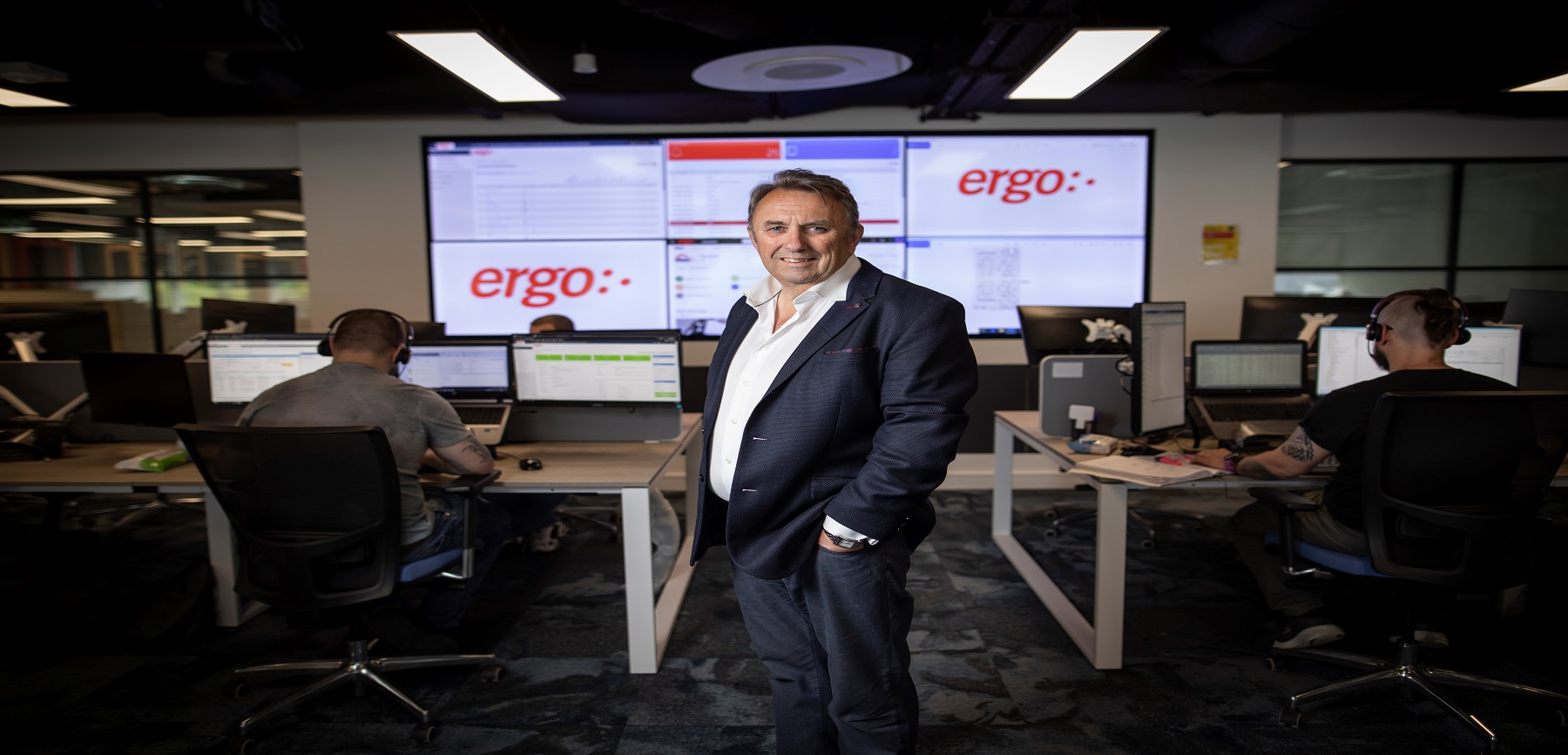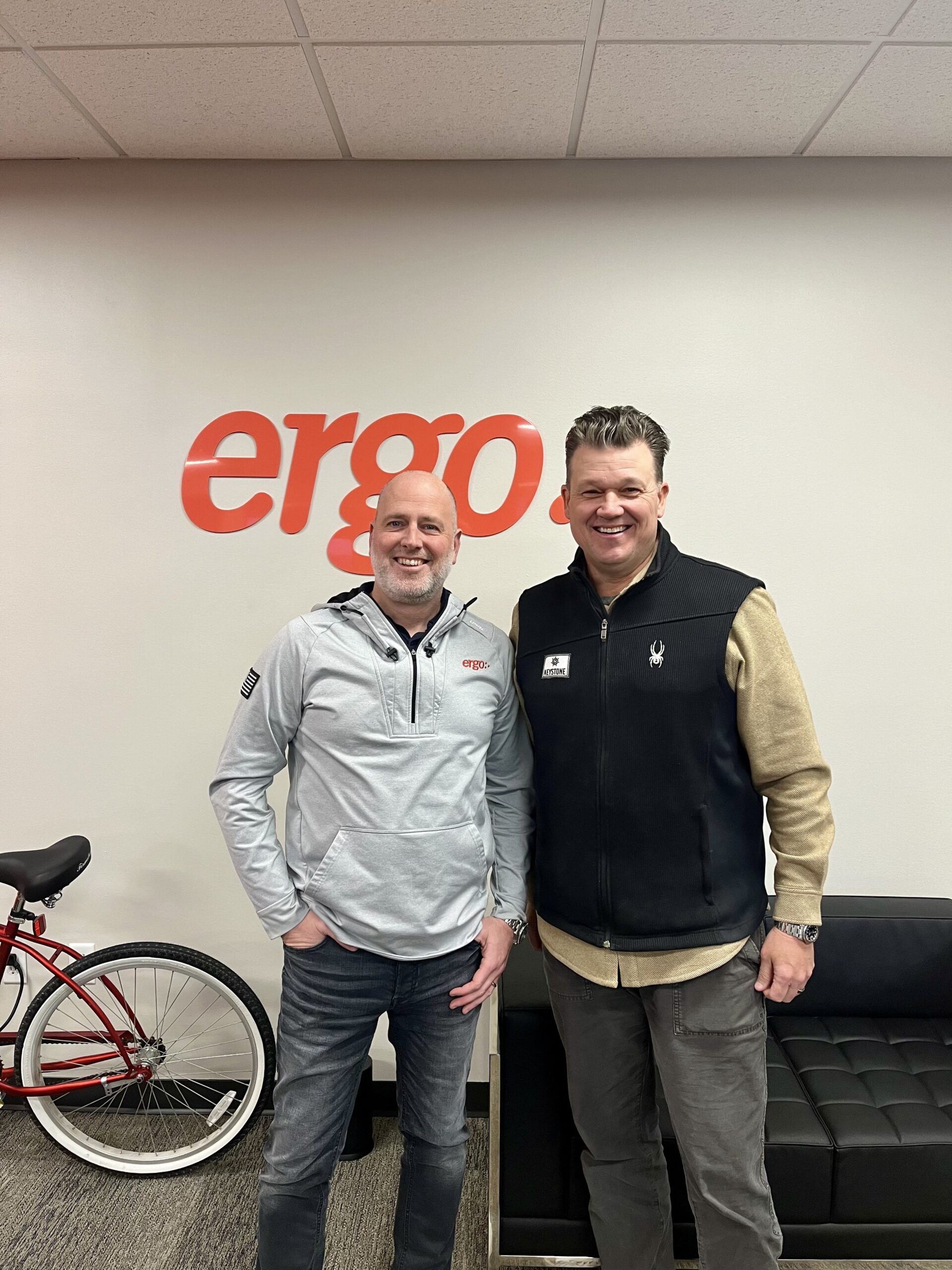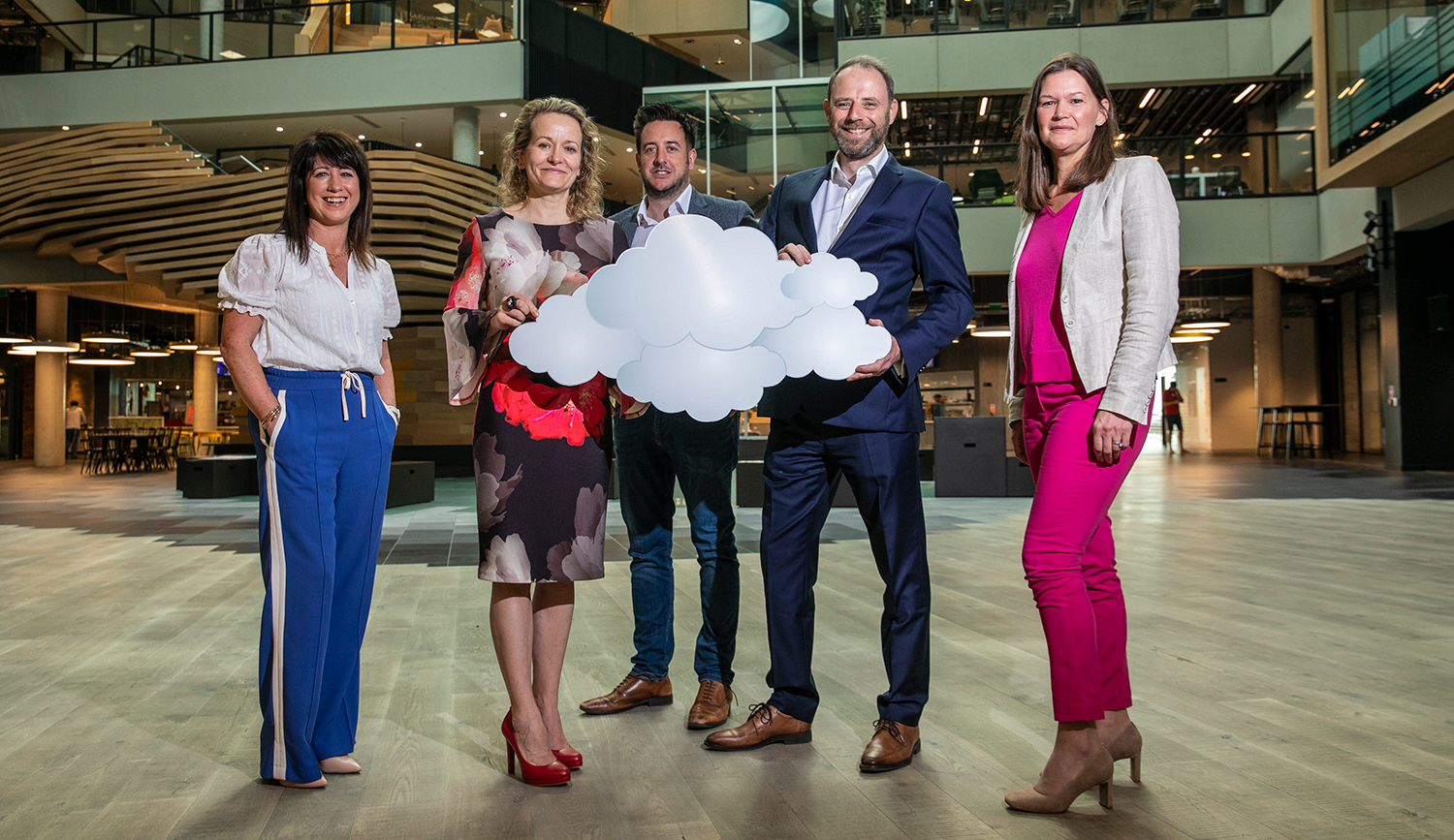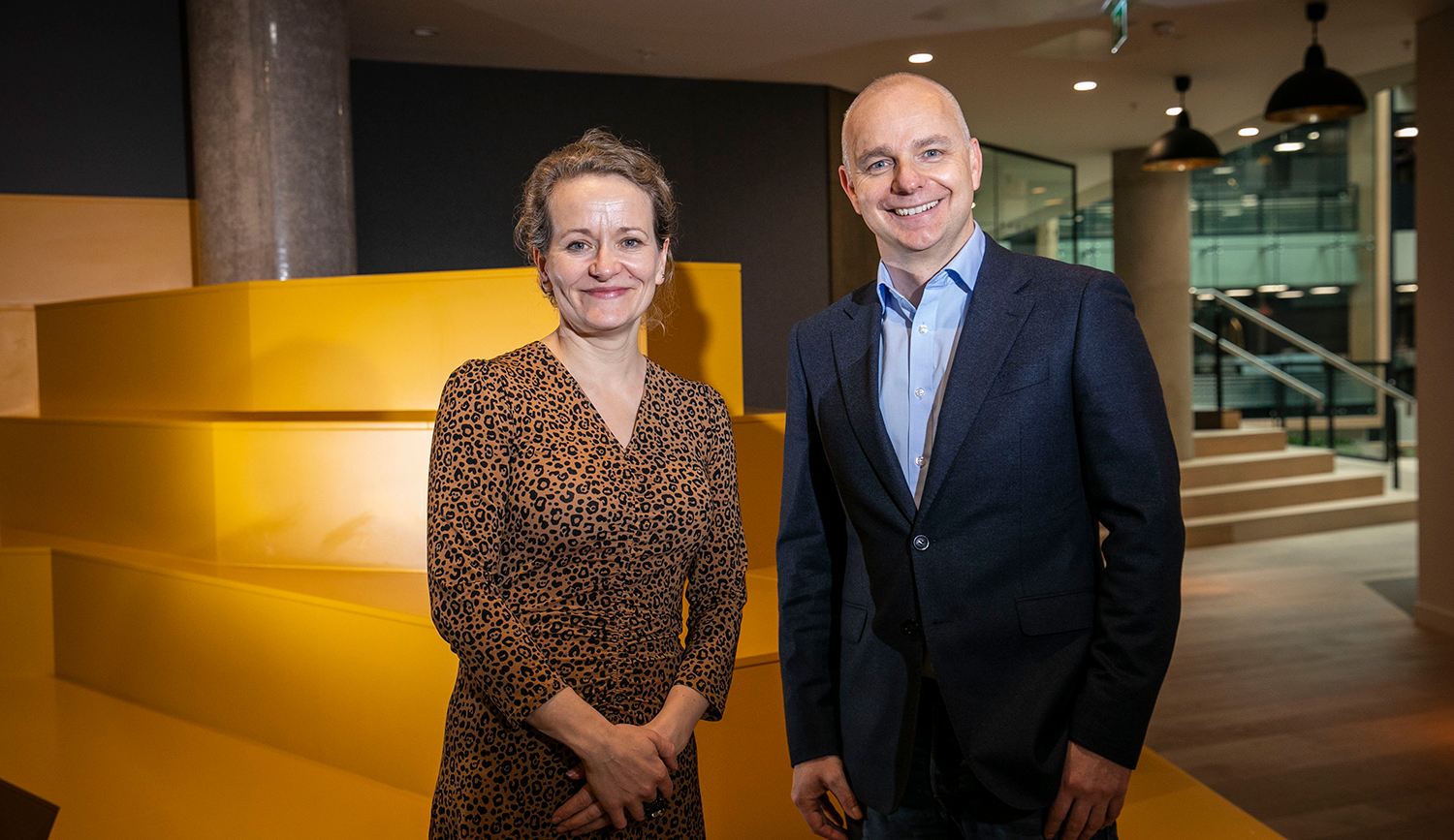A new chapter for the changing man at the head of Ergo – Sunday Business Post
After 27 years leading the IT services provider, John Purdy is still a man fixated on reinvention
Interview with Emmet Ryan, Technology Correspondent, Sunday Business Post
John Purdy, chief executive of Ergo: ‘The requirements our customers had in 2018 are very different to 2020 and they’ll be very different in 2022 again.’
One look at John Purdy’s home office and there’s no doubting his sporting allegiance. The co-founder and chief executive of the IT services provider Ergo doesn’t have a man-cave, but the décor of this particular room clearly points to his greatest love outside of his family: Manchester United.
He has also clearly taken the approach of Alex Ferguson to heart, never being happy to stand still. Purdy has been at the helm of Ergo for 27 years and is obsessed with reinvention. What wins for him today won’t be what gets the job done in a few years’ time, and he follows that principle diligently.
Purdy is speaking to the Business Post just after Ergo was named Microsoft‘s Country Partner of the Year, the fifth time the business has taken the trophy in the last decade, but the first since 2015. Given the changes he had instigated over those five years, he is particularly pleased to pick up the gong this time round.
“A couple of years ago, we made a couple of big bets. We invested heavily in a cloud skillset, we sank a lot of money into getting cloud-ready from a delivery perspective,” Purdy says.
“Quite frankly, there were times throughout the journey we questioned if we were right to keep investing. I can now say that we absolutely were. The accreditations we have set us apart from the field and will continue to.”
Having been heavily focused on the Irish market for most of its history, Ergo has grown its customer base internationally, with non-Irish business now accounting for 30 per cent of its business.
“That has accelerated in the last few months. If we’re working remotely, it doesn’t matter if we are in East Point [Business Park in Dublin] or Barcelona. Remote is remote. Once you have the governance and controls, that’s what works,” Purdy says.
“It’s not growth for the sake of growth. It’s growth in the right areas, it’s sustainable. We have a rule where we should grow 50 per cent through acquisition and 50 per cent organically. That fluctuates, but it’s a good barometer.”
Falling prices
Ergo hasn’t made any acquisitions since May 2016, its last two being iSite and Micromail, but Purdy said the environment is right to start looking again. Micromail has grown from €18 million revenue annually when Ergo bought it to €15 million in just the last quarter.
“In the market that has been out there, assets have been overpriced, but prices are falling now. There’s going to be market consolidation. Scale is really important in our industry,” Purdy says.
“You‘re either niche or you’re scaled. We’ve got to stay scaled and stay relevant. The requirements our customers had in 2018 are very different to 2020 and they’ll be very different in 2022 again.”
That view to the future is why Purdy is prouder of his firm’s most recent big win with Microsoft than the dominant spell at the start of the last decade.
“It’s the most important, and not because it’s the most recent. It’s the first one we’ve won in the new world. With prior wins, we were a traditional managed services provider. We had to do a massive pivot to become a cloud provider,” he says.
“That was like turning an oil tanker in Dublin Bay, it was a big job. We had to wean customers and staff off all the things that had served us so well up to that point.”
Understandably, it wasn’t always a fun process. When you decide that a formula that has worked for customers and staff alike won’t cut it any more, growing pains are unavoidable.
“I learn more from failure than success. It’s really important when we have failures that we understand why. Often it’s because of a misalignment with the customer or the inappropriate skillsets,” Purdy says.
“When you have that alignment with a customer, you have a much better chance of succeeding. We will never try to convince a customer to do something with us that we’re not good at. I’m long enough at this that I know it’s going to negate all the things I am good at.”
That perspective has also given him the ability to put the current crisis into perspective. He has been through the dotcom bubble, the 2008 crash and plenty more in almost three decades on the job.
“The difference with this is the speed of how it impacted. With this, we all came back from Christmas and saw it happen in China before moving from east to west. Within a matter of weeks, the world locally changed out of all recognition,” he says.
That presented Ergo with a mixture of challenges, as the crisis readiness of its customers varied substantially.
“It has been a bizarre set of circumstances. It was almost split down the middle between customers who were very prepared and those who were ill-prepared,” Purdy says.
“The first couple of weeks were very tactical, about getting people up and running. It was quick adoption across the board. Large programmes of work paused, but that has flipped on its head, now it‘s around strategies for the new normal.”
In order to make the most of the opportunity, Purdy is listening to as many decision-makers among his client base as he can.
“This is IT’s time to shine. All of a sudden, these are the most important people in a business and their value is seen. Organizations are seeing the value of adoption and change management,” he says.
“It’s about how we get people using the technology rather than the technology itself. We’re talking to the highest C-level executive we can in each customer to see what their bounce-back plan is.”
Inflection point
The decisions being made in the public sector are influencing the private sector, according to Purdy, with rapid deployment of remote solutions the norm.
“People are using this as an inflection point, and it’s certainly evident that government is influencing that. Government bodies didn’t want to move to cloud, but they’ve now changed fast to it because they know they will have people working from home,” he says.
“They know that there may be a second wave, that there are carbon emission targets they probably have to hit with the new government, and we’re going to see civil servants working more from home. That’s an enormous transformation.”
There’s also the next stage, when things return not so much to normal but to more on-site work than most businesses have become used to in the last four months. Purdy sees some aspects, like hiring staff, being face to face as soon as it is safe to do so.
“It’s going to be really hard to bring new people onto your team remotely. We’re social beings, we like having a coffee, we like going for a beer. When a vaccine is available, that will all normalize,” Purdy says. “Our customers are saying to us that they won’t need the same level of real estate as they were using, but they will need to invest in a new kind of IT.”
That’s not to say the IT task in managing the pandemic is done. Purdy still has work to do, but he reckons his business is ready.
“There is a lot of tidying up to be done with organizations around security and governance. There are positives. Most of us who have been around a while, we’re going through our third or fourth crisis so we know how to manage internal business and customer expectation differently,” he says.
“Irish businesses and people have shown they can adapt to change. Look at how well – with a small number of exceptions – the government, health officials and society have dealt with things. By and large, we’ve dealt with this in a common sense kind of way.”






